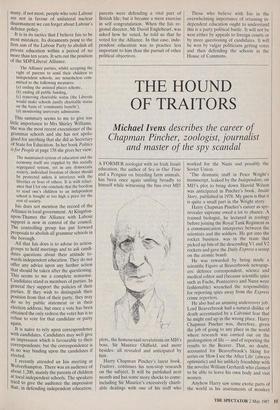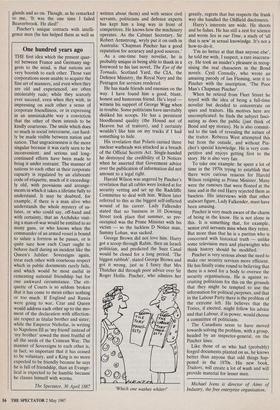THE HOUND OF TRAITORS
Michael Ivens describes the career of
Chapman Pincher, zoologist, journalist and master of the spy scandal
A FORMER zoologist with an Irish Jesuit education, the author of Sex in Our Time and a Penguin on breeding farm animals, has been once again smiling broadly to himself while witnessing the fuss over MI5
plots, the homosexual revelations on MI6's boss, Sir Maurice Oldfield, and more besides: all revealed and anticipated by him.
Harry Chapman Pincher's latest book, Traitors, continues his non-stop research on the subject. It will be published next month and has some more shocks to come: including Sir Maurice's excessively charit- able dealings with one of his staff who
worked for the Nazis and possibly the Soviet Union.
The dramatic stuff in Peter Wright's manuscript, leaked by the Independent, on MI5's plot to bring down Harold Wilson was anticipated in Pincher's book, Inside Story, published in 1978. My guess is that it is quite a small part in the Wright story.
Harry Chapman Pincher's career as spy- revealer supreme owed a lot to chance. A trained biologist, he lectured in zoology before joining the Royal Tank Regiment as a communication interpreter between the scientists and the soldiers. He got into the rocket business, was in the team that picked up bits of the descending V1 and V2 rockets and gave the Daily Express a scoop on the atomic bomb.
He was rewarded by being made a scientific Figaro at Beaverbrook newspap- ers: defence correspondent, science and medical editor and (because scientific spies such as Fuchs, Pontecorvo and Nunn were fashionable) wrenched the responsibility for reporting spies away from the Express crime reporters.
He also had an amusing undercover job. Lord Beaverbrook had a natural dislike of death accentuated by a Calvinist fear that he might end up in the wrong place. Harry Chapman Pincher was, therefore, given the job of going to any place in the world where research was carried out on the prolongation of life — and of reporting the results to the Beaver. That, no doubt, accounted for Beaverbrook's liking for series on 'How I see the After Life' (always optimistic) and his unlikely friendship with the novelist William Gerhardi who claimed to be able to leave his own body and visit women.
Anyhow Harry saw some exotic parts of the world in his assessments of monkey glands and so on. Though, as he remarked to me, 'It was the one time I failed Beaverbrook. He died!'
Pincher's unique contacts with intelli- gence men (he has helped them as well as written about them) and with senior civil servants, politicians and defence experts has kept him a long way in front of competitors. He knows how the machinery operates. As the Cabinet Secretary, Sir Robert Armstrong, wryly put it on oath in Australia: 'Chapman Pincher has a good reputation for accuracy and good sources.'
As a one-time busy novelist, he is probably unique in being able to thank in a foreword to his last novel, The Eye of the Tornado, Scotland Yard, the CIA, the Defence Ministry, the Royal Navy and the Pentagon for services rendered.
He has made friends and enemies on the way. I have found him a good, blunt, honest and humorous friend. He's loyal - witness his support of George Wigg when in trouble. Some politicians have inevitably disliked his scoops. He has a persistent bloodhound quality (the Hound not of Heaven but of traitors), and I certainly wouldn't like him on my tracks if I had something to hide.
His revelation that Polaris carried three nuclear warheads was attacked as a breach of the Official Secrets Act. Single-handed he destroyed the credibility of D Notices when he asserted that Goverment advice over the publication of information did not amount to a legal right.
Harold Wilson was angered by Pincher's revelation that all cables were looked at for security vetting and set up the Radcliffe Committee to deal with him. Wilson later referred to this as the biggest self-inflicted wound of his career. Lady Falkender stated that no business in 10 Downing Street took place that summer, so pre- occupied was the Prime Minister with his victim — so the luckless D Notice man, Sammy Lohan, was sacked.
George Brown did not love him. Harry got a scoop through Rabin, then an Israeli politician, and predicted the Suez Canal would be closed for a long period. 'The biggest rubbish', stated George Brown and got it wrong, just as I fancy that Mrs Thatcher did through poor advice over Sir Roger Hollis. Pincher, who admires her `Which one washes whiter!' greatly, regrets that but respects the frank way she handled the Oldfield disclosures.
Harry's interests are wide. He shoots and he fishes. He has still a zest for science and wrote Sex in our Time, a study of 'all that is new' in sexual knowledge. It's not a how-to-do-it.
`I'm no better at that than anyone else', he told me with, I suspect, a rare inaccura- cy. He took an insider's pleasure in recog- nising the real characters in the Bond novels. Cyril Connolly, who wrote an amusing parody of Ian Fleming, sent it to Pincher with the inscription, 'The Poor Man's Chapman Pincher'.
When he retired from Fleet Street he toyed with the idea of being a full-time novelist but decided to concentrate on spies and traitors. His motives here are uncomplicated: he finds the subject fasci- nating as does the public (just think of Bond and spy stories). He is also commit- ted to the task of revealing the nature of the traitor. Rebecca West attempted this but from the outside, and without Pin- cher's special knowledge. He is very com- petitive and enjoys getting first to the story. He is also very fair.
To take one example: he spent a lot of time in the 1970s trying to establish that there were curious reasons for Harold Wilson resigning as Prime Minister. Many were the rumours that were floated at the time and in the end Harry rejected them as baseless. His interviews with that other stalwart figure, Lady Falkender, must have been amusing.
Pincher is very much aware of the charm of being in the know. He is not alone in this. It is something that, for example, senior civil servants miss when they retire. But more than that he is a puritan who is concerned with historical truth — unlike some television men and playwrights who think history should be modified.
Pincher is very serious about the need to make our security services more efficient. He has finally come round to believing that there is a need for a body to oversee the security organisations. He is against re- cruiting politicians for this on the grounds that they might be tempted to use the information for political 'purposes, and that in the Labour Party there is the problem of the extreme left. He believes that the Tories, if elected, might follow his advice and that Labour, if in power, would choose a committee of politicians.
The Canadians seem to have moved towards solving the problem, with a group, headed by an inspector-general, on the Pincher lines.
Like those of us who had (probably) forged documents planted on us, he knows better than anyone that odd things hap- pened in the 1970s. His new book, Traitors, will create a lot of wash and will provide material for lesser men.
Michael Ivens is director of Aims of Industry, the free enterprise organisation.



















































 Previous page
Previous page